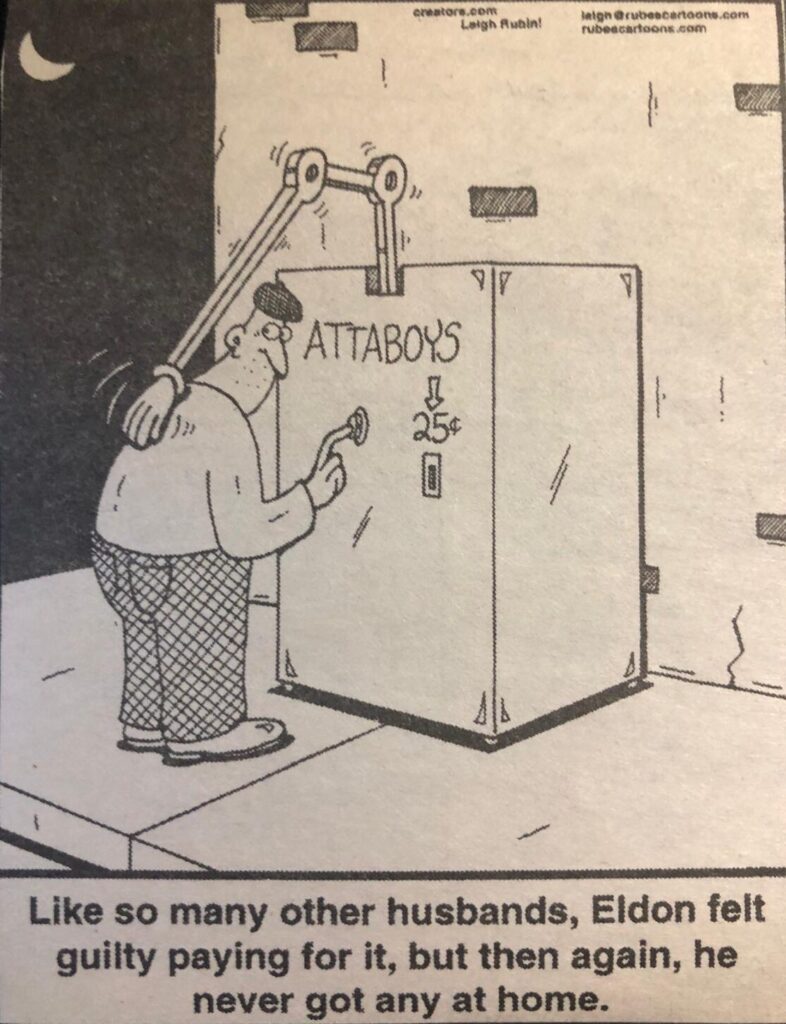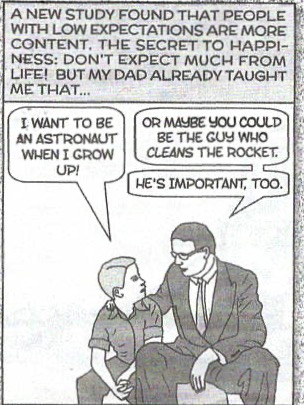Thoughts triggered by reading James Masterson’s “Psychotherapy of the Borderline Adult.”
Borderline-o-genesis: How enforced passivity in childhood might be related to the development of the symptom-complex that defines the Borderline Personality Disorder.
James Masterson got me thinking how enforced passivity in a child might be related to the development of the web of symptoms that defines the Borderline Personality Disorder.
Hey, Bucky! Have you ever felt depressed and blocked from doing something you dearly wanted to do? Have you ever had, say, Writer’s Block?
You put off doing this project you would love to do. And you don’t know why!
After a long period, maybe even years, you finally start your heart’s desire. You feel really good about having finally started. And you wonder what took you so long to begin? You feel as if you have finally made a major breakthrough that day. It feels good.
That night you go to sleep sweetly exhausted, and happy in the thought that you will continue at your very next opportunity?
And Lo! Instead of springing out of bed with a song in your heart and a smile on your lips, the next morning you are back to feeling depressed and hopeless. You just can’t get started at the precious project again? And you may be even more depressed than you were before you started!
Has this ever happened to you, Bucky?
What is going on here?
I think Masterson may have the answer…
James Masterson got me thinking how enforced passivity in a child might be related to the spider web of symptoms that defines the Borderline Personality Disorder.
Yes, I know, I’m repeating myself. It’s for emphasis. It’s the whole reason for this blog. I think Doctor Masterson triggered a major breakthrough in our understanding of normal emotional growth and borderline dynamics.
WHEN THINGS GO RIGHT:
We are all born with a little engine of assertiveness inside us. It takes the form of curiosity, dynamism and questioning. It is this innate assertiveness that impels us to explore the world around us. As children, we try different things and learn how the world works.
If we make a mistake, we learn from it, and try again. If we make another mistake, it’s a better mistake because we learned from the first one. If we keep trying, and make all the mistakes needed in order to learn the thing, and we finally master how to do the damn thing, then it rewards us with a pleasurable and tangible SENSE OF MASTERY and solidifies our SELF-IMAGE.
The more you LOVE something, the more you DO it. And the more you do it, the more you LEARN. The more you learn, the more you develop mastery and expertise. And that makes you feel GOOD. And if it leads to feeling good, you will tend to do it MORE OFTEN. And the more often you do something, the more you learn. It’s a blessed circle under normal circumstances. What could go wrong here?
Said another way: Learning to do things leads a child to INDEPENDENCE. And one job of a parent is to help the child learn things to become independent. Independence is not having to depend on others to take care of your needs. Parents are not gonna be around forever to meet the child’s dependency needs. Child needs to learn independence. It is the parents’ job to arrange that the child learn the skills needed for independence. Again, I ask: Now what could go wrong with this picture?
Lately we have become more aware of the importance of the ENVIRONMENT in which the child is growing up.
Language is located in the cortex of the brain. But that part of the brain that contains language is not fully developed at birth. Still, the child can learn stuff. But what it learns early-on isn’t coded in the verbal section of the brain because it is not developed yet. Before they can speak, the child wordlessly learns much. Even before the brain’s cortex is fully formed. Much is learned before they learn to talk or are able to put thoughts into words. All that they learn and know and perceive is learned and known and perceived wordlessly before the verbal cortex grows.
What does the child learn and perceive and know before they have words for it?
Lately we have become more aware of the importance of the environment in which the child is growing up. James Masterson’s book talked to me of certain authority figures punishing children for assertiveness, curiosity, dynamism and questioning. Did I say that already? What is the child learning wordlessly in an atmosphere that punishes for curiosity and assertiveness?
One possible result of being punished for your assertive behavior could be that you become passive in order to avoid the punishment. You shut down the little engine that drives you forward. You abort all action; hide your intelligence.
Now having done NOTHING, you have learned nothing, mastered nothing. You have not increased the pleasure of an improved self-image. A CHRONICALLY low self-image leads to depression. Now the Richness and Texture having gone out of your life, passivity leads to feelings of worthlessness and emptiness. Doing little leads to boredom. Life is empty. These are unbearable feelings. A person seeking relief from these feelings will seek mood changers, e.g., drugs. Drug use and self-destructive behavior, like cutting, are said to be ”Tension Relieving, not Goal Achieving.” Uh-oh, Borderline!
A possible CURE: Self analysis.
Try this as an exercise the next time you become aware you are depressed. Examine the recent past. What assertive thing did you just do? Did you do something you loved yesterday? Think back. Maybe there is something there. If it is, maybe your depression is caused by a past history of being punished for assertiveness. Or, were you doing something creative, positive, healing, but that someone you know wouldn’t have approved of? If so, I want you very depressed! It will mean that you are doing really assertive things, independent things, and you are on your way to learning stuff, increasing your competence and raising your self image. Action is the cure. But, wait! Action leads to punishment. What a dilemma!
According to an old DSM there were an almost infinite number of ways to be diagnosed as a borderline. You only needed a combination of symptoms to end up suffering a kind of paralysis.
The most extreme kind of Borderline suffering comes from a Gordian knot of interrelated feedback loops that cause the sufferer to go deeper and deeper into a sense of depression and hopelessness.
A possible cure:
one of the good things about a feed-back loop is that you can change it by intervening anywhere in the loop. Anywhere you intervene is a good place to start.
So, if you are feeling down, get active. Maybe do some mindless maintenance work. Maintenance work is not creative work. It is not considered dynamic as much as it is considered preparation for action. Wash some clothes, mop the floor, dust the lampshades, shop for food, arrange the house. If you do something, anything, you will feel better. If you feel better, you will do more. If you do more, you will anticipate punishment and get depressed. Now we are getting some where!
If you are depressed, it means you were no longer passive. You were active. Otherwise, you wouldn’t have felt depressed. Trust this feeling. If you feel depressed it means you did good!
Can you think of a solution to this apparent contradiction? Are you interested? Stay tuned…
Meanwhile, contemplate this idea. Try it on for size and see if it is valid: If you do something that deserves a medal, two things will happen.
First, You won’t get the medal.
Second, Somebody will complain about what you did. (lol. Do good anyway!)
Or, contemplate this idea: Education is not considered action. It is only PREPARATION for action. That is why some folks who were doing well in school, suddenly, and seemingly inexplicably, become distraught, panicked, disorganized, feeling overwhelmed, even psychotic, only as graduation approaches. This is because they anticipate that after graduation they will be expected to TAKE ACTION, i.e., DO important things and DECIDE important things and be MORE vulnerable to criticism (punishment).
Is that the origin of the Imposter Syndrome? A person that society applauds as successful, but who doesn’t feel successful. A successful person, but one who feels like a fraud.
****


More later…